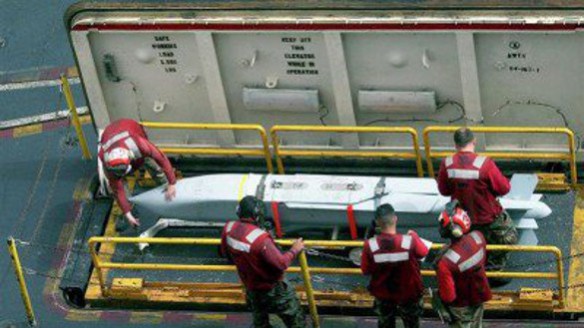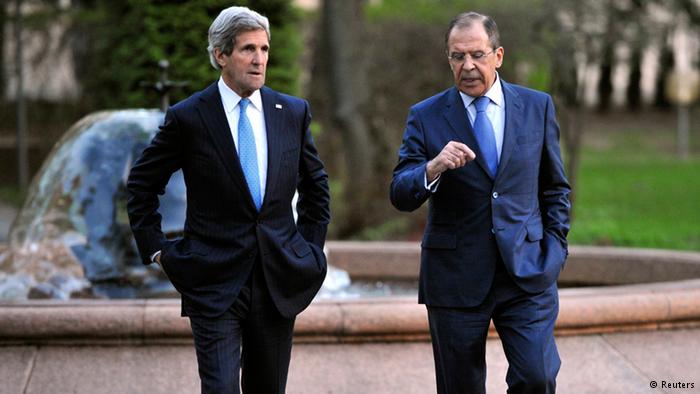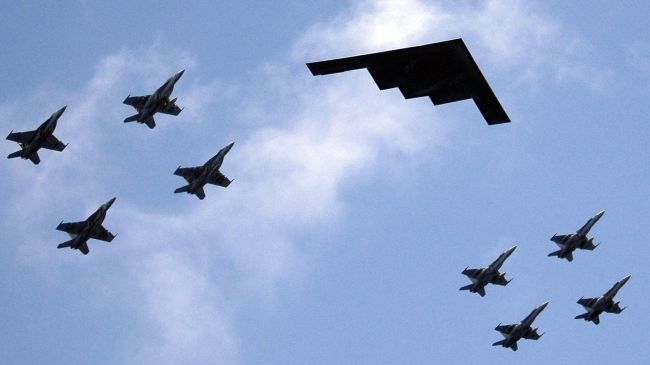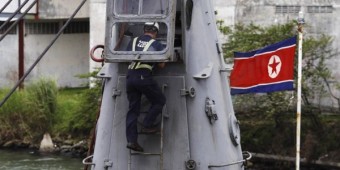
Calls for a war with Syria mounted yesterday, despite mass popular opposition to war in the United States, amid reports that US-backed Islamist opposition forces fighting the regime of Syrian President Bashar al-Assad have suffered serious reverses.
Speaking on NBC News yesterday, Turkish Prime Minister Recep Tayyip Erdogan pressed for Washington to take military action against Syria.
He repeated unsubstantiated allegations that the Assad regime has used chemical weapons, which have been refuted by UN investigator Carla del Ponte, claiming, “It is clear the regime has used chemical weapons and missiles.” Claiming that a “red line” had been crossed, he said: “We want the United States to assume more responsibilities and take further steps. And what sort of steps they will take, we are going to talk about this.”
Erdogan dismissed out of hand reports that chemical weapons used in Syria were in fact used by the US-backed opposition.
He stressed that his government would support US imposition of a “no-fly zone” in Syria, which would involve destroying Syrian air defenses and shooting down any Syrian aircraft that took to the skies.
Erdogan’s calls for military action were echoed across the American press. The Washington Post ’s editorial board called for “an air campaign as well as arms for the moderate opposition” aimed to “quickly tip the military balance against the Assad regime.” Wall Street Journal columnist Bret Stephens proposed a long list of attacks against Assad, including sending in US ground forces: “disable the runways of Syrian air bases, including the international airport in Damascus…use naval assets to impose a no-fly zone over western Syria…supply the Free Syrian Army with heavy military equipment, including armored personnel carriers and light tanks; and be prepared to seize and remove Syria’s chemical weapons stockpile, even if it means putting boots (temporarily) on the ground.”
The calls for war come amid reports of major setbacks in Syria for the US-backed opposition, reflecting its small size and lack of popular support, and growing military assistance from Russia, Iran, and Lebanon for the Assad regime.
After two months of heavy bombardment, government forces have retaken the strategic town of Khirbet Ghazaleh from the “rebels,” re-opening government transport routes to Deraa, the city where initial opposition protests began two years ago. Opposition leaders acknowledged it as a major setback. “Tomorrow, the big tragedy will happen, the regime’s supply route to Deraa will reopen, and the officers will go back and ammunition will be resupplied and the bombardment will resume,” said Abu Yacoub, commander of the Martyrs of Khirbet Ghazaleh brigade.
Yesterday, BBC Middle East bureau chief Paul Danahar wrote that the Free Syrian Army (FSA) amounts to little more than “men with guns,” united only by the fact that they “point their guns in the same direction.” He said the FSA is not a “cohesive force” and lacks a “command structure.”
A Jerusalem Post article of May 3rd entitled “Is Assad Winning in Syria?” describes the defeat of opposition militias around Qusayr by Hezbollah forces, as well as the capture of Otaiba by Assad’s forces last week, indicating the growing strength of Assad vis-à-vis the US proxy forces. According to the article, “morale among supporters of the regime has improved markedly in recent weeks.” It concluded, “Assad shows no signs of cracking.”
Under these conditions, Assad’s allies are stepping up military deliveries to Damascus. The Russian government has announced plans to sell S-300 anti-aircraft missile systems to Syria, in a $900 million deal that would substantially bolster the Syrian regime’s capacity to defend itself against US and Israeli airstrikes.
Secretary of State John Kerry criticized the sale as “destabilizing,” and the Israeli government appealed to Russia to halt the transaction. Syria’s purchase comes in after Israeli air strikes that used long-range “stand-off” missiles to attack Damascus from beyond the Syrian border.
On Thursday, Iran vowed to respond to the Israeli raids with “blows under the belt in several locations.” Iran’s envoy to Syria, Ali Akbar Salehi, promised “full and unlimited support from Iran, politically, militarily, and economically, to the Syrian leadership and people, against the takfiris [Al Qaeda-type Sunni extremist forces], terrorists, Israel, the US, and all who dare attack this country.”
Also on Thursday, Hezbollah leader Sheikh Hassan Nasrallah announced that Syria would supply his militia “special weapons it never had before,” calling the decision “game-changing.” The weapons are apparently being transferred as a response to Israel’s air strikes on Damascus. “This is the Syrian strategic reaction,” he explained.
These deliveries highlight the broad regional implications of the proxy war Washington has waged against the Assad regime, relying primarily on Islamist forces tied to Al Qaeda, and the risk of a US war in Syria escalating into a regional or even global conflict.
There is broad opposition in the working class to the US drive to war in Syria overseen by President Barack Obama and the Democratic Party. A recent poll pegged popular opposition to war at 62 percent of the US population.
The conflict has already taken a horrific toll on the Syrian people. Over the past several months, the number of Syrians displaced from their homes by the war has increased from 2 million to 4.25 million. A total of 6.8 million Syrians, including 3.1 million children, are classified as “in dire need of humanitarian assistance” by the UN’s Office of the Coordination of Humanitarian Affairs (OCHA).
Jordanian officials have stated that Syrian refugees now make up 10 percent of Jordan’s total population, with this figure set to explode to 40 percent by mid-2014 on current trends.
The ramping up of US military operations against Syria is accompanied by diplomatic efforts to bring about a post-Assad government on terms favorable to US imperialism. Secretary of State John Kerry has sought an agreement with Russia, which would pave the way for a power-sharing arrangement.
This plan also received significant endorsement in US strategic and media circles. Zbigniew Brzezinski, a prominent architect of US imperial policy, issued a strong criticism of proposed US military action against Syria, proposing instead to try to involve Russia and China in US plans to remove Assad through diplomacy.
He said,
“The various schemes that have been proposed for a kind of tiddlywinks intervention from around the edges of the conflict—no-fly zones, bombing Damascus and so forth—would simply make the situation worse. None of the proposals would result in an outcome strategically beneficial for the US On the contrary, they would produce a more complex, undefined slide into the worst-case scenario. The only solution is to seek Russia’s and China’s support for U.N.-sponsored elections in which, with luck, Assad might be ‘persuaded’ not to participate.”
Along these lines, David Ignatius of the Washington Post proposed “a military transition government” that would include “reconcilable elements of Assad’s army,” under the leadership of US-backed General Salim Idriss, a defector who now commands Syrian opposition forces.
Effectively, US officials are hoping that, in the context of negotiations jointly organized by the Russian government, they could persuade Syrian officers to organize a coup to oust Assad, and then make a deal with the US-backed opposition. Their plan involves a new ruling coalition composed of opposition and regime elements, described by Ignatius as a “military transition government that would include reconcilable elements of Assad’s army.” Assad would be removed, though lower-ranking members of his government might remain.
http://www.globalresearch.ca/us-prepares-war-with-syria-as-washington-backed-al-qaeda-rebels-lose-ground/5334587






 The recent seizure of a North Korean freighter carrying Cuban, nuclear-capable SA-2 missile components for refurbishment has resurrected the spectre of the 1962 Cuban missile crisis, when another communist nation developed nuclear dealings with America’s island neighbor.
The recent seizure of a North Korean freighter carrying Cuban, nuclear-capable SA-2 missile components for refurbishment has resurrected the spectre of the 1962 Cuban missile crisis, when another communist nation developed nuclear dealings with America’s island neighbor. 




 on this and other marginally less dire threats, Defense Secretary Chuck Hagel said that the US military “will unequivocally defend, and is unequivocally committed to the alliance with, South Korea.” Some former US Special Operations Forces and longtime Korea defense analysts have their own thoughts on what an ‘unequivocal’ US military response could look like. That includes how US troops would be deployed in the event of a lethal first strike on US and allied military forces by North Korea – precisely the sort of move Kim has been threatening to make. Patrick Cronin, senior director of the Asia-Pacific Security Program at the Center for a New American Security, said that should Kim choose to do “something even more outlandish,” the US military and South Korean response would be more dire. Retired Brig. General Russell Howard, former commander of the 1st Special Forces Group, which has an Asia focus, said that should Kim decide to begin firing them, he says, “in the first few hours of the conflict, it would be pretty ugly.” At the same time, North Korea could begin “swarming” its sizable contingent of 600,000 Special Operations commandos, Howard added, now the director of the Terrorism, Research, and Education Program at the Monterey Institute of International Studies, the report added. –
on this and other marginally less dire threats, Defense Secretary Chuck Hagel said that the US military “will unequivocally defend, and is unequivocally committed to the alliance with, South Korea.” Some former US Special Operations Forces and longtime Korea defense analysts have their own thoughts on what an ‘unequivocal’ US military response could look like. That includes how US troops would be deployed in the event of a lethal first strike on US and allied military forces by North Korea – precisely the sort of move Kim has been threatening to make. Patrick Cronin, senior director of the Asia-Pacific Security Program at the Center for a New American Security, said that should Kim choose to do “something even more outlandish,” the US military and South Korean response would be more dire. Retired Brig. General Russell Howard, former commander of the 1st Special Forces Group, which has an Asia focus, said that should Kim decide to begin firing them, he says, “in the first few hours of the conflict, it would be pretty ugly.” At the same time, North Korea could begin “swarming” its sizable contingent of 600,000 Special Operations commandos, Howard added, now the director of the Terrorism, Research, and Education Program at the Monterey Institute of International Studies, the report added. –
 Mark LeDoux, chairman and CEO, Natural AlternativesInternational: The first obvious issue that arises from this report is that the “healthcare” system in America is a misnomer. We don’t provide healthcare, we provide sick care. Many of the commondiseases that lead to our mortality rates being high are directly linked to what we affectionately call “high-risk behaviors.”
Mark LeDoux, chairman and CEO, Natural AlternativesInternational: The first obvious issue that arises from this report is that the “healthcare” system in America is a misnomer. We don’t provide healthcare, we provide sick care. Many of the commondiseases that lead to our mortality rates being high are directly linked to what we affectionately call “high-risk behaviors.” Steve Mister, president and CEO, Council for Responsible Nutrition: This report is certainly troubling. At the same time, maybe it illuminates some opportunities for potential growth in the U.S. supplement marketplace. As the researchers noted, it’s not any one factor, but rather a whole collection of health-related behaviors that contributes to the U.S.’s health score.
Steve Mister, president and CEO, Council for Responsible Nutrition: This report is certainly troubling. At the same time, maybe it illuminates some opportunities for potential growth in the U.S. supplement marketplace. As the researchers noted, it’s not any one factor, but rather a whole collection of health-related behaviors that contributes to the U.S.’s health score. Robert Craven, CEO, Food State (MegaFood): Like Mark, I am convinced that new legislation will do very little – although I was in favor of the super-size soft drink ban in NYC. I got into a Facebook fight on this one as some of my friends started saying that this was taking away “freedom” and “liberty” and I made the point that if your liberty and freedom starts costing me money it ceases to be your freedom. But I digress.
Robert Craven, CEO, Food State (MegaFood): Like Mark, I am convinced that new legislation will do very little – although I was in favor of the super-size soft drink ban in NYC. I got into a Facebook fight on this one as some of my friends started saying that this was taking away “freedom” and “liberty” and I made the point that if your liberty and freedom starts costing me money it ceases to be your freedom. But I digress.